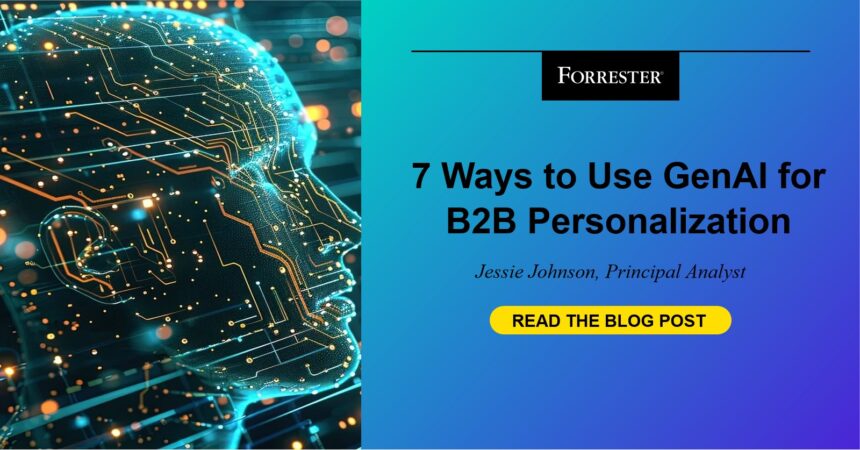B2B buyers and customers aren’t seeking more content from providers or new ways to see their first name and company used in otherwise generic messaging. Rather, they crave relevance and responsiveness — the right content delivered in the moment of need, specific to their role, in a suitable format. Forrester’s data shows that 82% of global B2B marketing decision-makers agree that buyers expect an experience personalized to their needs and preferences across marketing and sales, and 75% agree that buyers and customers expect an immediate response to their questions.
Personalization continues to rank among the top use cases for AI in B2B organizations. In the spotlight now is generative AI (genAI) and its promises to boost creativity and scalability with the mass production of content variations to fuel B2B personalization. But using genAI as a content production machine underutilizes the technology’s real value.
B2B Personalization Is Now Shaped By Prompt Language
GenAI introduces new capabilities to evolve B2B personalization into contextual interactions that are designed, assembled, and delivered in the moment using what’s known, inferred, and predicted about its audience. Get started now with these seven strategic and practical ways to use genAI to deliver more impactful, sustained, and efficient personalization throughout the B2B customer lifecycle:
- Leverage content as data to power signal-driven personalization. Content provides a valuable source of timely, high-voltage audience interest signals that provide critical context for personalization. GenAI helps B2B marketers leverage content as data by detecting, classifying, and extracting buying signals from content consumption behavior and natural language interactions with prospects and customers. These signals are the basis of the creation and orchestration of meaningfully personalized interactions that can sense and respond to audience context, needs, and preferences in real time.
- Get to know the unknown. GenAI offers new ways to address an old problem: how to deliver the relevance that audiences demand when visitors are reluctant to provide their data on forms. GenAI enables real-time response to signals captured from website behavior, allowing deeper personalization without overreliance on personal data and content gates. There are two primary ways that genAI enables B2B website personalization for anonymous visitors: in-session and in-conversation. Session activity generates more meaningful signals than static form data, while chatbots greet and engage anonymous audiences to help profile visitors, qualify demand, and facilitate conversational search or commerce.
- Fuel omnichannel personalization. GenAI powers automated conversations with practical use cases spanning the customer lifecycle and supporting a range of revenue marketing program objectives. Conversational exchanges with prospects and customers create signals that should inform marketing and sales plays to drive consistency and value in personalization across synchronous and asynchronous delivery mechanisms. Already, buyers and customers can chat with high-value assets, content hubs, and web properties using natural language. GenAI can then use unstructured data from these conversations to generate structured, portable buying signals for go-to-market teams to act upon.
- Use synthetic data to simulate complex journeys. The number of possible renditions of personalization techniques within a single tactic multiplies exponentially in real time during activation as each behavior (or lack of) creates new signals and possible responses. Synthetic data generated by AI can be used to map and simulate complex B2B buying journeys, helping marketers imagine and reimagine myriad outcomes based on evolving behaviors, business conditions, and buyer or customer group dynamics without relying on personal data. This enables deeper understanding of audiences and interaction paths influenced by individual behaviors, external information sources, and group-level engagement at each stage of the journey.
- Go hyperlocal and multilingual. An interaction can be neither personalized nor inclusive if it isn’t localized — comprehension is compromised, impact is lost, and providers risk alienating or offending their customers. GenAI helps deliver content and conversations in multiple formats and languages, enabling high-value content to be created, customized, and repackaged for various mediums, modalities, and locales. Multinational, multilocation enterprises should experiment with multilingual content generation to deliver on-brand, local-level content customization at scale.
- Customize everything — with care. GenAI can add a more “human” touch to B2B personalization through customization of generated content, automated conversations, and AI assistant personas. This includes the tone, style, personality, and visual elements that serve as the digital extension of a brand, function, or human influencer. B2B marketing leaders must provide strategic guidance for customizing AI assistants and outputs. AI-powered customer-facing interactions must be transparent and authentic, or these new innovative approaches will become the new deepfakes in B2B marketing.
- Skip the small talk. Be realistic about what AI can and can’t do within your workflows to design, deploy, optimize, measure, and scale B2B personalization. Define how genAI will be used to analyze, activate, and adapt personalized experiences in B2B, and consider the amount of time it takes to edit and fine-tune an increased volume of content components. Enable human team members to chat with company and customer data, and provide guidance for articulating prompts focused on signal-driven personalization.
Personalization can help B2B organizations demonstrate their commitment to be responsive, relevant, respectful, and aligned around a common goal of helping buyers and customers make better decisions. GenAI has potential to help go-to-market teams uplevel personalization, reduce journey friction, and increase B2B marketing and sales efficiency.








